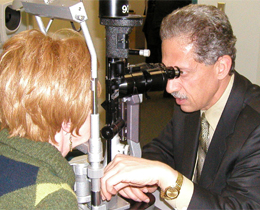Diagnosing A Cataract

If your vision is blurry and you suspect that you may have a cataract you need to go and see your eye care professional and have a thorough eye exam done. A thorough eye exam will determine if a cataract is present and will give the eye care professional a look at the entire health of your eye to see if any other eye conditions are present and to also give your doctor a clear understanding of what your outcome will be after having cataract surgery. Some patients who have eye diseases, which affect the retina, may not have a good result from having cataract surgery. This must be explained to the patient prior to surgery so he or she will have a clear understanding of their outcome.
During the examination, Dr. Tayfour will discuss with you what difficulties you are having with your vision and how this is affecting your daily life. We will check your vision using an eye chart. Your eyes will be dilated using drops to enlarge the pupils, this allows the doctor to see more of the lens and retina and look for other eye conditions.
Once you are diagnosed with a cataract, Dr. Tayfour will discuss whether you should undergo surgery or wait until your vision interferes with your daily activities. Most patients have cataract surgery once they can no longer see well enough to drive, however, if you do not drive and you can still function normally you do not need to undergo surgery. In the past, doctors used to wait until the cataract was “ripe or mature” before removing it and patient’s were left to live with very limited vision prior to removal. Thanks to dramatic advances in cataract surgery, it is no longer necessary to wait for the cataract to mature. Once your vision interferes with your daily activities, you can have them removed.